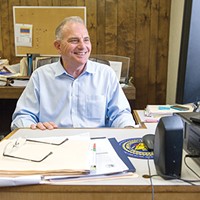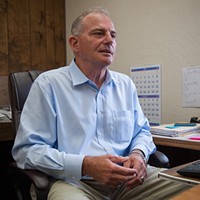Judge Cuts to the Chase in Public Defender Lawsuit
Court sets Dec. 13 hearing to determine minimum qualifications for the job
By Thadeus Greenson [email protected] @ThadeusGreenson[
{
"name": "Top Stories Video Pair",
"insertPoint": "7",
"component": "17087298",
"parentWrapperClass": "fdn-ads-inline-content-block",
"requiredCountToDisplay": "1"
}
]
Next month, visiting Humboldt County Superior Court Judge Marjorie Carter will attempt to block out all the noise surrounding Public Defender David Marcus — the allegations of political witch hunts and incompetence, shoddy work histories and politics — and home in on a simple question.
"The bottom line is we're going to have to determine what this statute means," Carter said at a Nov. 13 hearing in the case Eureka attorney Patrik Griego brought against the county, alleging that Marcus didn't meet minimum state qualifications for the post when the county hired him Feb. 8.
At the hearing, Carter decided she can't determine if Marcus meets those qualifications without first deciding what they are, which sounds simple enough until you look at the 70-year-old, single sentence embedded in Section 27701 of the California Government Code: "A person is not eligible to the office of public defender unless he has been a practicing attorney in all of the courts of the state for at least the year preceding the date of his election or appointment."
There are three basic interpretations of what the statute means. It could mean that a candidate simply needs to have been licensed to practice law in the state for the year prior to his or her hire. Or, as the county is arguing, it could mean that a qualified hire would simply need to have spent the year practicing California law. Or, as Griego's suit alleges, it could require that a qualified candidate have spent the prior year practicing in California criminal and civil courts, making appearances, writing pleadings and representing clients.
Carter's interpretation of the statute will decide if and how the case moves forward, and what becomes of an office that's been shrouded in controversy since the Humboldt County Board of Supervisors tapped Marcus to replace retired Public Defender Kevin Robinson.
After a controversial hiring process that included an interview panel comprised of the county's top prosecutor, its undersheriff and its probation chief but not a single defense attorney, the supervisors chose Marcus, who'd spent 20 years defending indigent clients in San Bernardino and Lassen counties, but hadn't handled a criminal case in five years. The hiring immediately came under fire and Griego's lawsuit followed soon after.
In the suit, Griego argues that lawmakers intended the state statute to ensure that a public defender has the experience necessary to guarantee a county's most vulnerable residents are adequately represented in court and their rights are defended. To this end, Griego argues, legislators wanted to ensure a candidate had been practicing both civil and criminal law.
But the county has a different interpretation, which was evident in the Humboldt County code long before County Counsel Jeff Blanck began arguing this case. In contrast to the California Government Code's requirement, the county code simply requires that an attorney be "licensed to practice" in all the courts of the state for at least one year prior to the appointment. Interestingly, though, Blanck hasn't taken that tack in pleadings in the immediate case and has instead argued that the state code requires an attorney to have been practicing California law for the year prior to his or her hire.
Carter's decision, which could come as soon as at the Dec. 13 hearing, will cut to the very heart of the case.
If she decides the statute simply requires that a candidate have been licensed to practice law in the state, there's no question Marcus meets that as he's maintained an active bar license since 1980. Case closed.
And if Carter goes the other direction and agrees with Griego that the statute actually requires a qualified candidate to have physically practiced in California civil and criminal courts — making appearances, authoring pleadings and filing motions — it seems Marcus' tenure is doomed, as he testified under oath during a deposition that he hadn't appeared in a California court or worked a criminal case since 2012, shortly after he left Lassen County. Case similarly closed.
But if Carter decides the statute requires a candidate to have practiced California law for the year preceding appointment, the case will plod forward to an evidentiary hearing in which attorneys will try to suss out exactly what Marcus was doing from February of 2016 to February of 2017, which is a matter of much dispute.
There's no question Marcus has a lengthy background in criminal defense. He spent more than 13 years working as a deputy public defender in San Bernardino County and about seven running the Lassen County Public Defender's Office. (There's also no question he was a controversial figure both places, resigning his San Bernardino post without notice via a Post-it note and leaving Lassen after a scathing grand jury report accused him of only spending 30 to 40 percent of his days at work. See "'Nibs' and 'The Taz,'" Aug. 10.)
But things are decidedly murkier when looking at his immediate work history and what he did after moving to Florida in 2012 and before applying for the position in Humboldt County.
On his resume submitted to the county, Marcus represented that he'd worked about 10 hours a week as a contract attorney specializing in transactional real estate and property loss consulting since 2012 with the Walnut Creek firm Cella, Lange and Cella.
But when deposed under oath in this case, Marcus represented that he was working primarily as an insurance claims adjuster while in Florida and averaged only about five hours a week with Cella, Lange and Cella on four cases in the year before being hired by Humboldt County. But the public defender conceded he authored no pleadings, made no court appearances, didn't maintain malpractice insurance and hadn't been paid for any of his work. He testified that he wasn't under written contract with Cella, Lange and Cella or any clients, but that he had a verbal agreement with a partner in the firm, Chris Cella, a longtime personal friend of his, under which Cella would pay Marcus at the conclusion of the cases he worked depending on his contributions and their ultimate outcomes. But he testified that he kept no written records of the hours he worked for the firm.
Griego has argued in pleadings in the case that Marcus' claims aren't credible, while Blanck has maintained that Griego hasn't brought forward any evidence to refute them. Interestingly, Cella, whose sworn testimony seemingly would have the potential to buttress or discredit Marcus' claims wasn't deposed by Griego, isn't on Blanck's current deposition schedule and hasn't offered any declaration in the case.
If Carter goes with the third option, it will clearly set up future rounds of legal wrangling. Already, Griego has accused Blanck of unnecessarily delaying the case with the goal of dragging it out until the anniversary of Marcus' hire, at which point he will have fulfilled the statutory requirements and even if found ineligible at the time of his hire could simply be rehired by the board. Blanck, on the other hand, has countered that Griego is attempting to deprive the county of its right to gather the evidence necessary to mount an adequate defense.
Meanwhile, as the case drags on, there are tangible impacts to the controversy and uncertainty surrounding the office, which represents more than 80 percent of criminal defendants in Humboldt County Superior Court. A handful of experienced attorneys have left the office — with one blasting Marcus on her way out the door (see "Things Can Fall Apart," Sept. 28) — and the resulting staffing shortage has impacted court calendars and caused delays in some high-profile cases. And some of Marcus' clients have complained of inadequate representation, including a man currently serving a prison term that's reportedly substantially longer than what Marcus represented when he pleaded guilty in his case.
During the Nov. 13 hearing, Blanck indicated that one of the things he's looking to depose public defender employees about is this reported "cloud hanging over the office" and if there are any tangible impacts, if there's been any irreparable harm.
"So far [from depositions] the irreparable harm is the cloud over the office," Blanck said. "Well, we're up in Humboldt and we get a lot of clouds here, and they come and go."
Carter asked Griego and Blanck to submit pleadings on the statutory interpretation by Dec. 7 and responses by Dec. 12. It's unclear if she will rule from the bench after hearing arguments Dec. 13 or take the matter under submission.
Thaddeus Greenson is the Journal's news editor. Reach him at 442-1400, extension 321, or [email protected]. Follow him on Twitter @thadeusgreenson.
Comments (5)
Showing 1-5 of 5
more from the author
-
Deputy Shoots Cutten Shooting Suspect
- Apr 25, 2024
-
Officials Weigh in on SCOTUS Case's Local Implications
- Apr 25, 2024
-
Arcata Lowers Earth Flag as Initiative Proponents Promise Appeal
- Apr 25, 2024
- More »
Latest in News
Readers also liked…
-
Through Mark Larson's Lens
A local photographer's favorite images of 2022 in Humboldt
- Jan 5, 2023
-
'To Celebrate Our Sovereignty'
Yurok Tribe to host gathering honoring 'ultimate river warrior' on the anniversary of the U.S. Supreme Court ruling that changed everything
- Jun 8, 2023






































